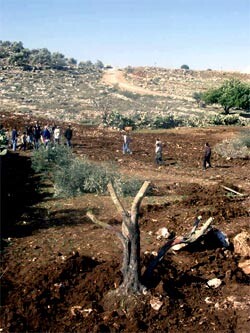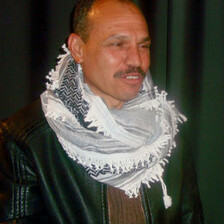The Electronic Intifada 16 July 2004
The International Court of Justice’s (ICJ) decision against Israel’s Apartheid Wall is an important step forward. It will not matter on the ground because Israel ignores many international decisions, but it will increase people’s trust in the justice of our struggle and their support for our cause.

Olve fields in Budrus after the Israeli army bulldozers passed through, December 2003. (StopTheWall.org)
We fear that the gate will only be open for a few hours, like in other places where the Wall is finished. So if someone misses the opening they will spend the night outside their home waiting. There are no hospitals, universities, or civil institutions in these nine villages, and many of the people work in Ramallah. The Wall will prevent thousands of Palestinians from going to work, school, universities, and hospitals.
We already live in a prison, surrounded by settlements and checkpoints. So it is hard for me to imagine a Wall surrounding my village and the eight other villages. It will become a prison within a prison. As a young Palestinian woman, I dream of becoming a doctor, as we in Palestine don’t have enough doctors. However, the Wall may prevent me from studying in a university.
On Nov 23rd, 2003, Wall construction started in Budrus, and we immediately began holding peaceful demonstrations opposing it. The Israeli authorities planned to take 250 acres of Budrus’ land and bulldoze our olive groves. The day construction began, the soldiers formed a line to prevent us from reaching the bulldozers, but I was able to cut through the line and sit in front of the bulldozer.
Surrounded by dozens of soldiers, I was afraid, until one of the international demonstrators joined me in front of the bulldozer. Three soldiers then left the line to remove me, opening the way for others to join us. As others came, the bulldozer left the field. We stopped Wall construction that day.
We protested peacefully for three months until March 1, when the Israeli authorities said they would move the Wall to the Green Line, so that Budrus would not lose land. Recently, the Israeli authorities told us that they still want to take 44 acres of our land, and Budrus and eight other villages will also still be surrounded by the Wall. So we will continue to struggle against the theft of our land.
Though our demonstrations were peaceful, the Israeli soldiers wounded 102 persons. They used sound bombs, teargas, and rubber-coated steel bullets, and beat men and women with clubs. In Biddu and Beitunia, villages near Jerusalem, Israeli soldiers killed six people during protests against the Wall.
The Israeli military tried to stop Budrus’ peaceful protests by arresting leaders and participants. Thirteen men from Budrus, including my father, two uncles, two cousins, and a 15-year-old classmate were arrested.
The soldiers’ violence scares me, but to make my dreams a reality I have to participate in the peaceful struggle against that Wall. I cannot imagine a future without an independent Palestinian state, but if this Wall is completed, our state will be born in several separate pieces.
Nonviolent resistance against the Wall requires everyone. Our entire community participated in protests, men with women, elders with children, and Palestinians with Israelis and internationals.
I had never dealt with Israelis as friends before. Israelis were always occupiers and soldiers. During the first demonstration I met three women who became my first Israeli friends. They believe the Wall will not bring them security, and they wish more Israelis would see what is happening on the ground.
I now have many Israeli friends. A friendly relationship between Palestinians and Israelis is important, because I look to the future when there will be a Palestinian state within the 1967 borders next to Israel. Security and understanding requires friendship.
The ICJ’s decision reaffirms our right to struggle against the Wall, and encourages me to continue. We in Budrus and in many other West Bank villages are already implementing the ICJ decision on the ground through protests. Please support us in ending this oppressive Israeli military occupation of our land.
Related Links
Iltezam Morrar is a 15-year-old student, living in the Palestinian village of Budrus, near Ramallah.


